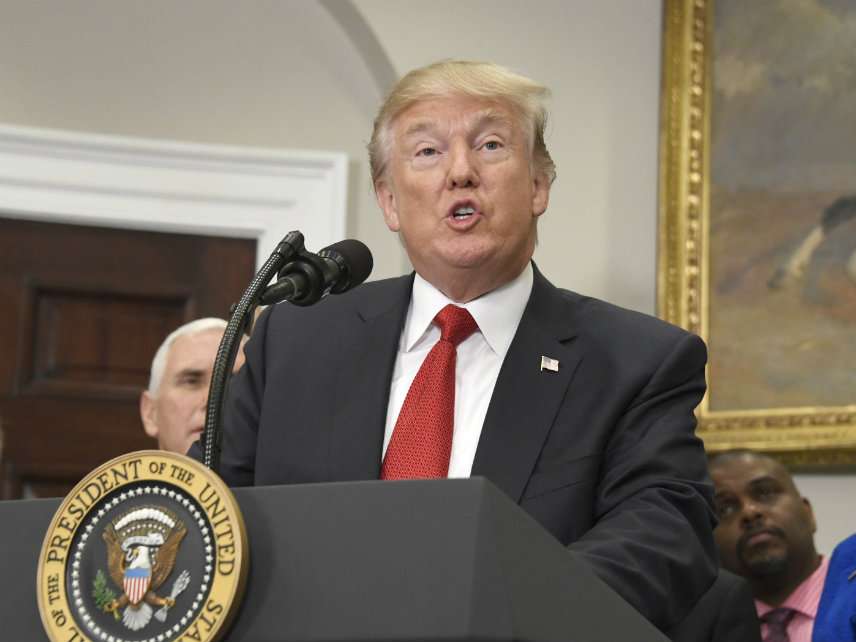By Cutting Off Obamacare's Insurer Subsidies, Trump Might Help More People Get Health Coverage
The president has finally brought the law into constitutional compliance.

President Trump announced today that he will stop making payments to health insurers under Obamacare.
The payments, which are called for by statute, began under President Obama. But a federal court ruled last year that because Congress never appropriated funding, making the payments violated the separation of powers and thus was illegal. Obama, however, kept paying them anyway. So, up until now, has Trump. With this move, Trump brings the administration of Obamacare into constitutional compliance.
Supporters of Obamacare have already started complaining that President Trump's decision amounts to sabotage. Sen. Chris Murphy (D-Ct.), for example charged on Twitter this morning that stopping the health care payments "is nuclear grade bananas - a temper tantrum that sets the entire health system on fire." President Trump, who has threatened to cut off the payments all year in an attempt to create bargaining leverage, almost certainly sees the move as a way of kneecapping the exchanges.
But there's something funny about the move: In the long run, it might actually increase the number of people with health insurance coverage. It would cost the government more, cause short-term turbulence, and increase the deficit, but after it all shakes out, Obamacare would end up covering even more people. Trump might have just made Obamacare more generous.
The payments in question are known as cost-sharing reduction (CSR) subsidies. They are paid directly to insurers, and they provide extra financial for individuals who make between 100 and 250 percent of the poverty line. Cut those subsidies off, and insurers will try to make up the difference by raising premiums. In a report on the likely effects of cutting off the subsidies earlier this year, the Congressional Budget Office estimated that premiums would be about 20 percent higher for typical plans purchased under the law.
But the premium hikes won't directly affect most low-income people, however, because Obamacare's subsidies increase with premiums, insulating those individuals from higher costs. Instead, this move is likely to raise premiums for people who earn too much to qualify for subsidies under Obamacare—which is to say, the people who have already been hit hardest by the law's price hikes. The expansion of the subsidies, meanwhile, gets paid for by taxpayers, increasing the deficit by about $194 billion over the next decade.
What CBO expects to happen, then, is that, as a result of premium increases, higher income people will find Obamacare plans less appealing, and fewer will buy coverage next year, resulting in about 1 million fewer people with health coverage in 2018. But over time, the increased subsidies would actually make coverage more attractive for those with qualifying incomes. By 2026, the CBO projects, about a million more people will have coverage.
If CBO is right, in other words, Trump's decision to cut off CSRs will make Obamacare more expensive for taxpayers, but will also result in more people with subsidized coverage over time. Regardless of what Trump intends, that doesn't exactly sound like sabotage.
The CBO could be wrong, of course. The agency's coverage estimates have certainly been off before. But the budget office's analysis is, at minimum, a reminder that the long-term effects of this change could be more complex than many people seem to think. If nothing else, this decision will act as a stress test of CBO's insurance coverage model.
There are other wrinkles too: As law professor Nicholas Bagley points out, insurers are likely to sue over lost payments, which this year come to about $7 billion. The payments were not appropriated by Congress, but they are called for in the statute of the health care law, and insurers may well win. Health insurers have already won suits against the government in related cases involving other subsidies built into the law.
President Trump, meanwhile, still appears to have a worrying view of his own authority with regards to the subsidies. The entire point of the case against them was that the White House, under Obama, did not have the authority to decide whether or not to pay them, because under the Constitution, the power of the purse lies with Congress alone. Either Congress appropriated them, or it didn't, and in either case the executive branch would have a duty to spend, or not spend, accordingly. Congress didn't appropriate the money, and therefore neither Obama nor Trump had the authority to make the payments.
If Trump actually believes the payments are unconstitutional, he should have stopped making the payments immediately upon taking office. But he didn't. He repeatedly dangled the possibility of cutting off the payments, and administration health officials reportedly also hinted that they might continue making them if insurers supported the GOP's health care legislation this summer.
Trump, in other words, has acted as if the decision to pay or not is the president's to make. The point of last year's federal ruling is that it is not.
Yet he still seems to believe that it is. Early this morning, after news broke that he would cut off the payments, he tweeted that he was still willing to bargain. "The Democrats ObamaCare is imploding," he wrote. "Massive subsidy payments to their pet insurance companies has stopped. Dems should call me to fix!"
The Democrats ObamaCare is imploding. Massive subsidy payments to their pet insurance companies has stopped. Dems should call me to fix!
— Donald J. Trump (@realDonaldTrump) October 13, 2017
This is not Trump's to "fix." It is a decision for Congress and Congress alone. Perpetuating the idea that the decision should or can come from the White House helps erode the rule of law.
Cutting off the payments has, for the moment, brought Trump's into constitutional compliance, but it's not clear that Trump himself actually understands what that means.


Show Comments (91)